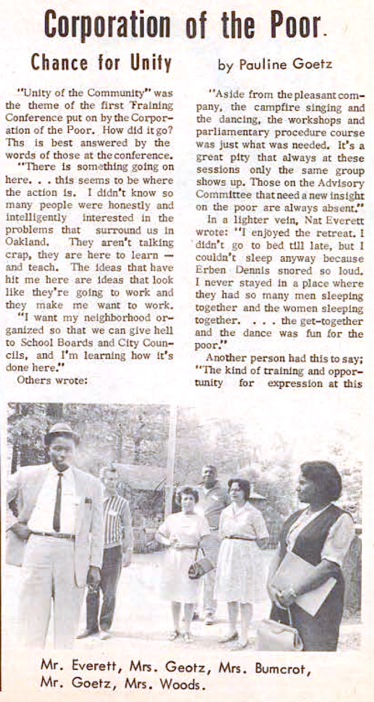The anti-poverty warriors of The Flatlands did not limit themselves to campaigning for community representation in the Oakland Economic Development Council (OEDC). Program funding from the Ford Foundation and the War on Poverty was welcome but insufficient, in activists’ eyes. Oakland’s poverty crisis was multi-causal, reflecting the impact of systemic racism and economic disinvestment on the employment prospects of black Oaklanders. To combat this, greater redistributive measures than long-overdue aid were needed.
One demand made by activists and ordinary people alike sought to empower poor and unemployed people through capital grants to prospective business owners, which would then bolster economic self-sufficiency in black communities. In Oakland, these efforts were carried out, in large part, by the Corporation of the Poor (CotP), whose group retreat into the hills Pauline Goetz chronicles here. Goetz and her husband Bill, along with Bill Lowe, were CotP’s lead organizers, but other Flatlands figures like Agnes Woods, Erben Dennis and Naythinuel Everett played key roles in the organization and were among the retreat’s attendees.
Goetz laments that Target Area Advisory Committee (TAAC) members “stayed away in droves,” but by all accounts the retreat was a barnburner for those who chose to attend. Future Oakland Post publisher Paul Cobb, ever the strategist, gave a speech on parliamentary procedure in light of the upcoming 51% representation battle with the OEDC, while poverty worker Nat Shaffer spoke on neighborhood organization. Attendees did not spend all of their time listening to speakers, however; per Goetz, the retreat was characterized by “a spirit of unity and comradeship,” with “dancing, card games and other recreation” in the evenings.
